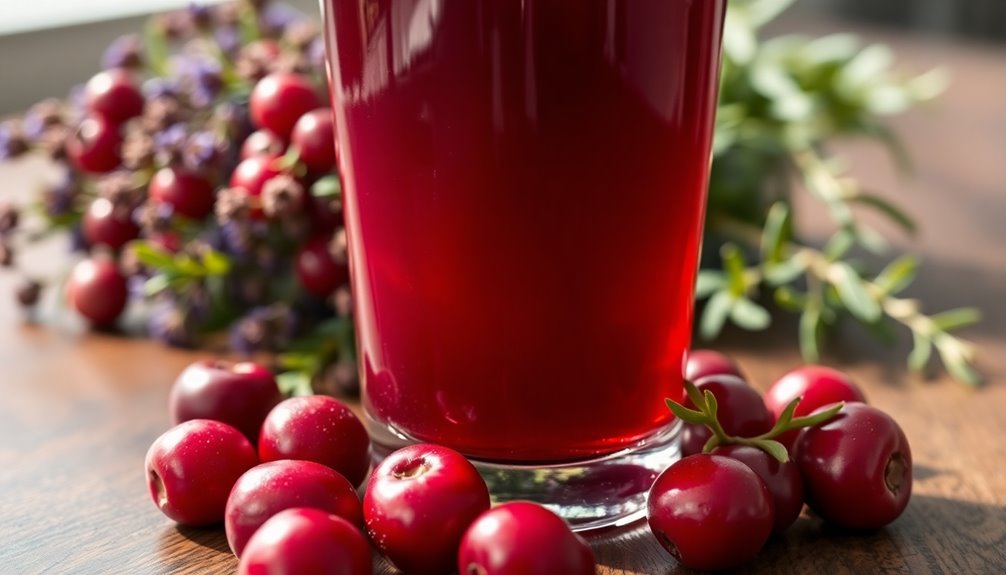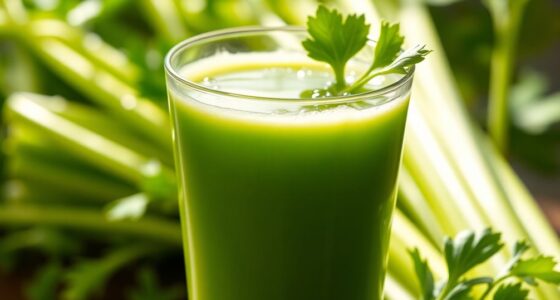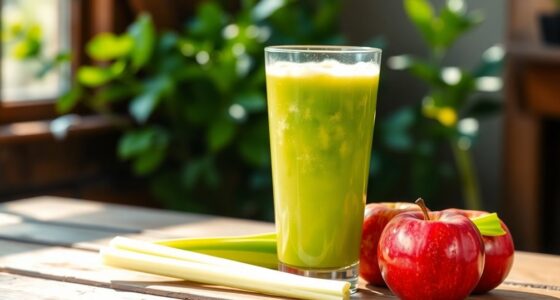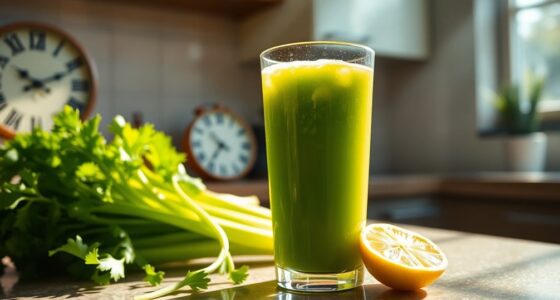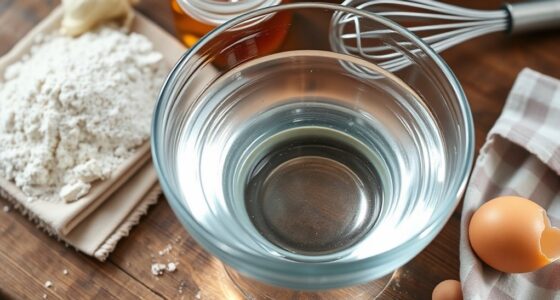Cranberry juice might help prevent UTIs by stopping E. coli bacteria from sticking to your urinary tract. The proanthocyanidins in cranberries may offer some protective benefits, especially when consumed regularly. However, it's important to know that cranberry juice isn't a cure for existing infections, and its effectiveness can vary. If you're looking for more remedies or tips on managing UTIs, you'll want to explore further options that can support your urinary health.
Key Takeaways
- Cranberry juice may help prevent UTIs by preventing E. coli from adhering to the urinary tract walls.
- The effectiveness of cranberry juice varies, and it's not a substitute for antibiotic treatment.
- Regular consumption of unsweetened cranberry juice could aid in UTI prevention, but evidence is mixed.
- Individuals on anticoagulant medications should avoid cranberry products due to potential bleeding risks.
- Always consult a healthcare professional for recurrent UTIs or if symptoms persist beyond 24 hours.
Understanding Urinary Tract Infections (UTIs)

When you think about urinary tract infections (UTIs), it's important to understand how they occur and who they affect.
UTIs are caused by bacteria entering the urinary tract, with E. coli being the most common culprit. They impact around 60% of women and 12% of men at least once in their lifetime.
Symptoms like burning during urination, frequent urges to go, and strong-smelling urine can be distressing.
To help prevent UTIs, proper hygiene practices, such as wiping front to back and urinating after sex, are key.
While antibiotics are standard treatments, some individuals prefer home remedies.
Understanding these factors can empower you to take action and reduce your risk of experiencing UTIs in the future.
The Role of Cranberry Juice in UTI Prevention
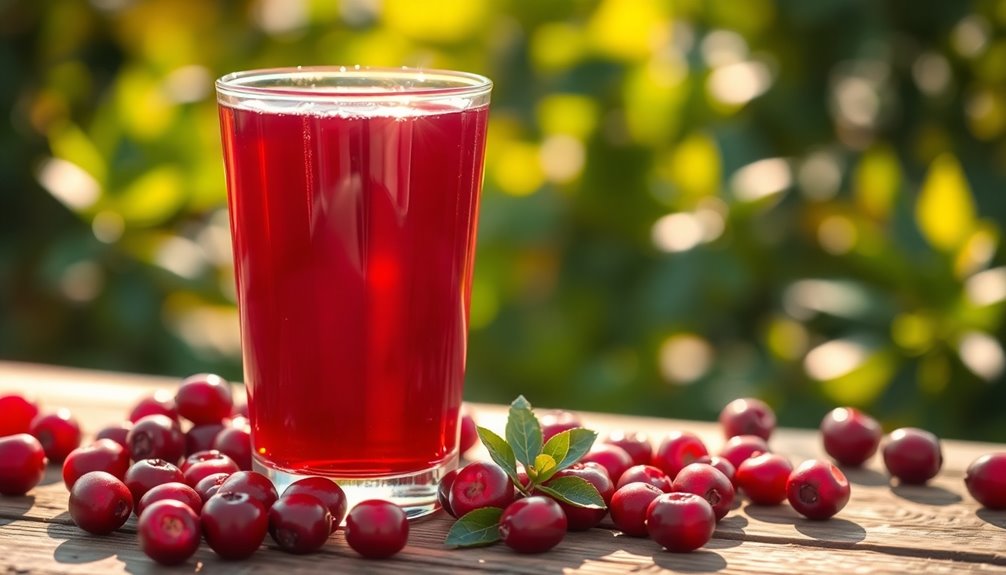
Cranberry juice is often touted as a natural remedy for preventing urinary tract infections (UTIs) due to its potential ability to stop E. coli bacteria from sticking to the urinary tract walls.
The key compounds in cranberries, known as proanthocyanidins, are believed to play a role in this protective effect. Regular consumption of unsweetened cranberry juice might help some individuals prevent urinary tract infections, but the evidence is mixed.
While some studies suggest benefits, others show no significant impact. It's important to remember that cranberry juice shouldn't replace medical treatment for existing UTIs.
Always consult with a healthcare professional regarding your options, especially if you experience recurrent UTIs and consider incorporating cranberry juice into your routine for potential prevention.
Limitations of Cranberry Products for Treating UTIs
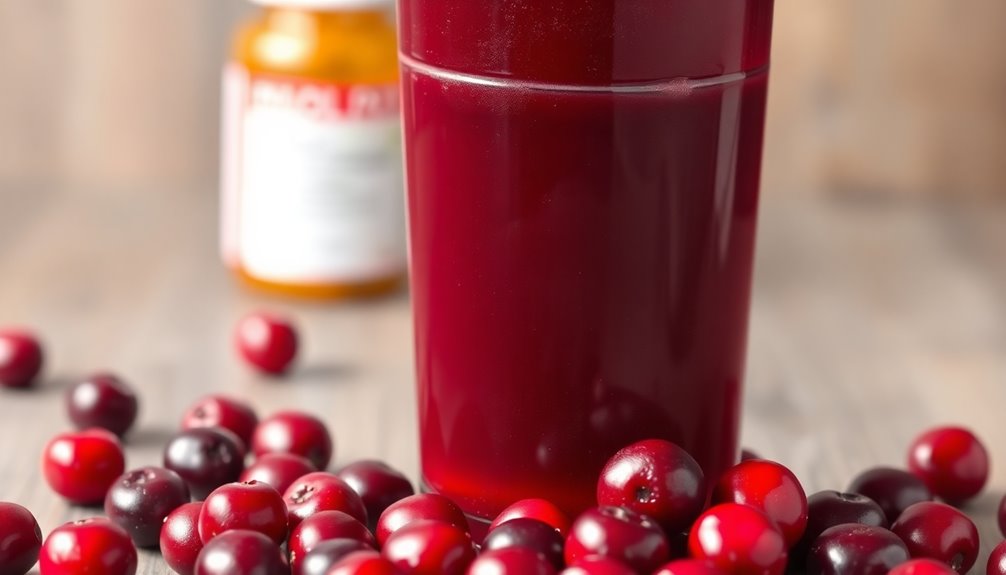
While many people turn to cranberry products hoping to treat urinary tract infections (UTIs), their effectiveness in this regard is limited. Research findings indicate that cranberry juice and supplements don’t considerably reduce UTI risk, highlighting their ineffectiveness. Moreover, some studies suggest that cranberry juice may not only fail to prevent UTIs but could also influence the formation of kidney stones in susceptible individuals. The high oxalate content in cranberry products has raised concerns regarding their potential link to kidney stone development. Therefore, individuals should approach the use of cranberry juice and kidney stones with caution, particularly if they have a history of urinary issues.
Smaller studies suggesting benefits often suffer from high participant dropout rates, affecting reliability. The variation in proanthocyanidin content among cranberry products can also influence their ability to prevent bacterial adhesion, a key factor in UTI development.
Additionally, cranberry products rarely help in treating existing UTIs, as definitive studies proving their effectiveness are lacking.
It's crucial to note that individuals on anticoagulant medication should avoid cranberry products due to the risk of increased bleeding, further limiting their use.
Alternative Home Remedies for UTIs

Considering the limitations of cranberry products for treating UTIs, many people seek alternative home remedies to manage their symptoms and prevent future infections.
Drinking plenty of water is essential; it helps flush out bacteria and supports urinary health. Unsweetened cranberry juice may prevent bacteria from sticking to urinary tract walls, but its effectiveness for existing infections is still debated.
D-mannose, a natural sugar, interferes with E. coli adhesion, making it a popular choice for prevention. Additionally, garlic's antibacterial properties can help reduce UTI-causing bacteria, while probiotics replenish healthy gut bacteria, further supporting your immune system. Incorporating natural remedies can enhance your defense against urinary tract infections and promote overall wellness.
When to Seek Medical Attention for UTIs
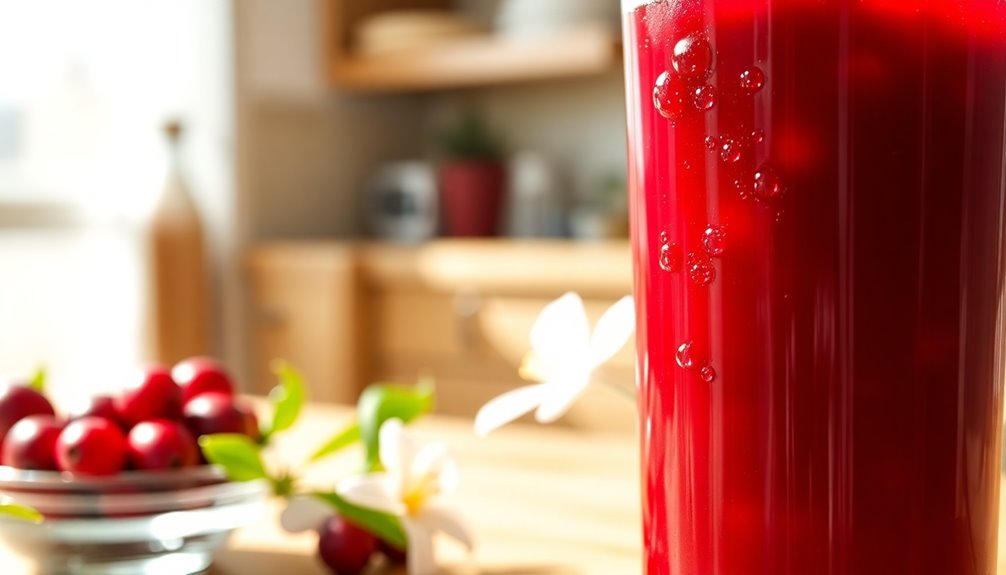
Knowing when to seek medical attention for a urinary tract infection (UTI) is essential for effective treatment and prevention of complications.
If you experience a burning sensation during urination, frequent urination, or pelvic pain lasting more than a day, it's time to consult a healthcare provider.
Urgent care is necessary if you notice blood in your urine, have a fever or chills, or suffer severe abdominal pain, as these could indicate a serious infection.
If you've had recurrent UTIs—two or more in six months—don't hesitate to seek medical advice.
Pregnant women should act quickly if they suspect a UTI.
Also, if home remedies like increased hydration or cranberry juice don't improve your symptoms within 24 hours, contact a professional. Early detection through proper medical evaluation is crucial in preventing further complications.
Frequently Asked Questions
How Do You Flush Out a UTI Asap?
To flush out a UTI ASAP, start by drinking plenty of water—aim for at least eight glasses a day. This helps dilute your urine and flush out harmful bacteria.
Don't hold in your urine; urinate frequently to expel more bacteria.
Consider unsweetened cranberry juice to potentially prevent bacteria from sticking to your urinary tract. Adding vitamin C can also help acidify your urine, making it less hospitable for bacteria.
Probiotics may support overall urinary health, too.
How Long Does It Take Cranberry Juice to Work Down There?
Imagine sipping a revitalizing wave of cranberry juice, hoping it'll wash away your discomfort. You might wonder how long it takes for that crimson elixir to work its magic.
While some folks feel relief within 24 hours, others experience a wait that stretches longer. Typically, consuming about 8 ounces daily could help, but remember, everyone's different.
It's essential to keep in mind that medical treatment might still be necessary for significant improvement.
When Should You Not Drink Cranberry Juice?
You should avoid drinking cranberry juice if you're on blood thinners like warfarin, as it can increase bleeding risk.
If you have a history of kidney stones, steer clear due to its high oxalate content.
Those with stomach sensitivity or acid reflux might find the acidity aggravating.
Also, if you're prone to digestive issues, limit your intake, as excessive amounts can lead to diarrhea.
Always check with a healthcare provider for personalized advice.
How to Stop a UTI When You Feel One Coming On?
When you feel a UTI trying to sneak up on you, it's like a thief in the night!
First, drink plenty of water to flush out those pesky bacteria.
Consider unsweetened cranberry juice to help keep them from sticking around.
Don't forget to take probiotics to boost your good bacteria, and incorporate garlic into your meals for its antibacterial magic.
Finally, always practice good hygiene to fend off those unwanted invaders!
Conclusion
In the journey of battling UTIs, think of cranberry juice as a protective shield, bolstering your defenses rather than fighting the enemy directly. While it can help in prevention, it shouldn't replace medical advice. Just as a compass guides you through uncharted waters, knowing when to seek help is essential. Embrace cranberry juice as a supportive ally, but don't hesitate to call in reinforcements when needed. Your health is the treasure worth protecting!
Cindy thoroughly researches juicing trends, techniques, and recipes to provide readers with practical advice and inspiration. Her writing style is accessible, engaging, and designed to make complex concepts easy to understand. Cindy’s dedication to promoting the advantages of juicing shines through her work, empowering readers to make positive changes in their lives through the simple act of juicing.

